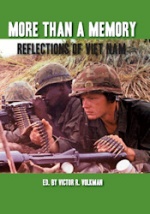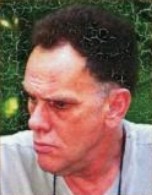God Laughs In Colors
By Tom Skiens
Nov. 12, 2009
I was a tree vet again this year at the local Veterans Day ceremony. Just like the Nam vets in D.C. who hang out in the tree line on the ridge above the bowl that hosts The Wall. I used to occupy a spot in the trees on the southwest corner of the pond. A brown water sailor vet buddy joined me sometimes and things were good. I walked from my house and timed it so I arrived at my spot when the crowd was still moving around. Civilians don’t have their heads on a swivel scanning the tree line both high and low. They are content to look straight ahead or at their shoes or at the person beside them. I would move into position and no one noticed.
Later a civilian wannabe asked if we minded if he joined us. We minded, but let him join anyway. The civilian asked stupid questions and made way too much noise as if to yell, “I am in the trees with the vets, I must be cool.” He moved around too much which gave away our location. He wanted attention and we were in the trees to avoid same. The next year the ceremony organizers plugged in a loud speaker so the tree vets could hear. I stopped attending the Veterans Day ceremony.
I visit the Veterans memorial at the parks and recreation’s Seventh Street Complex in John Day Oregon often. I do it in the dark of night or before daylight in the early morning hours. Several years ago I volunteered to spend many days and hours on my knees laying pavers or screeding sand or chasing a compactor in the construction of this memorial. I learned to mix mortar while helping to build a granite podium that would support the marble engraved centerpiece to the monument.
And now things have come full circle. The memorial was falling apart, in September of 2009 the flag pole broke off. In October of 2009 I saw activity at the memorial and again volunteered. Just like I volunteered for the draft, the infantry, Vietnam, and as a Forward Observer, to go on patrols and ambushes, and to walk through the mine field more than once. I volunteered because someone had to. I volunteered because
God laughs in colors.
It is April 19, 1968. I am the fourth person back in the left column. The other column is less than 10 yards to my right. We should not be this bunched up. God knows we have hit enough booby traps to learn. I see and hear an explosion to my right front less than 15 yards away. I drop to the ground but before my stomach touches I am on my way back up.
I know what this is. It is the same thing as January 13, 1968. A Bouncing Betty leaves us with two dead and eight wounded. Zimmerman and I are the next two unwounded in the column and we must walk the line. Today is not much different.
I move to the right column, drop my rucksack and get the PRC 25 radio from my radio telephone operator. 0900, “grid square BS 533853 Company C request dust off for two KHA, two WHA result bouncing Betty.” I move into the zone making sure the path is clear for the medics. A fucking new guy walking point in the left column has hot steel in his stomach.
The F.N.G. came in on the resupply chopper the night before and has been with the company less than 14 hours. The company put him in first Platoon and first Platoon put him on the point in the left column. First day in the bush and the F.N.G. gets hot steel in his stomach which may result in him going home. The guy at my feet is dead. The next guy is dead. The next guy, Platoon leader, LT. his right foot is blown off and his right hand does not look good, he will probably lose it. He is moaning from shock and pain. His weapon has been thrown to the right, it is destroyed, useless.
I yell at the F.N.G. to stop running around because he may set off another mine. Sgt. Don Fox, who will assume command of 1st platoon because the LT. is down, and Zimmerman talk the F.N.G. to safety. In three days Zimmerman and I will be on our bellies crawling over to Sgt.Fox who will have a bullet in his gut that penetrated through his weapon before entering his body. Higher/higher said it was Automatic weapons fire, but, I was standing four feet away and only remember 1 round. Three days after the Sgt. Fox dust off, Zimmerman, who has gone from PFC to platoon leader in the course of seven days, will be involved in another Bouncing Betty and I will on the radio calling in another dust off for him and three others. Charlie Company’s first platoon, first squad is getting beat up for the second time in our first four months in country.
A medic asks me to help put one of the dead guys on a poncho so we can drag him to the approaching chopper.
I rifle through the guys rucksack to get a poncho while the medic rolls him onto his back. I find pieces of bone and blood on the inside of the grunts rucksack. For the first time I look at the dead guys face. It is my friend John-John.
I am stunned, shocked. This is the day, the hour, the minute and the grid coordinates where the American dream dies for me. Dark clouds invade my mind; a deep numbing pain penetrates my soul. The medic wants me to lift the right side of the body. John-John is pulverized flesh from head to toe, like the Gook on the receiving end of a B-52 package. Concussion and shrapnel have transformed his body into the consistency of firm Jelly. I can’t find anything solid enough to lift.
A year passes, then two, finally I see the middle finger of his right hand, I test it to see if it will stay attached to his body when I lift him. I grab a hand full of bloody pants leg with my right hand and lift the lower part of his body off the ground. I pray that pieces of his body do not come off in my hands as I lift my dark, broken friend high enough to set him on the poncho.
April 19, 1968, 0900 hours, grid BS533853, I died, the dream ends, no preparation, I be zombie. I died because it was the easiest and fastest way to deal with my problem. I could not move forward while packing the weight of the dead and I could not leave them behind. I must sacrifice a part of my soul so my body can move on. I don’t have time to mourn, only to tuck the memory of the mangled bodies into the corners of my mind and keep on humping.
The corners of my mind will meld over time
The visions of the dead come more often.
I’ve recorded their names and absolved them of chains
While I’m busy constructing my own coffin.
God laughs at my notions in green, red and blue. He decided I wouldn’t die. I assure you I went out of my way to prove God wrong. On July 3, 1968 I returned from my Singapore R & R with a 4X4 Orange tarp I planned to use as ground cover in the bush. I sometimes carried this Orange tarp on the outside of my Rucksack. I would have a radio antenna sticking above my head and I would walk point. Laughter is full of colors.
God laughs in colors
I see in black and white.
My fears dark and hidden;
The laughter filled with light
Forty-one years after Gods watercolor wash I have conducted 50 critical incident debriefings, organized 4 interventions, talked three suicides down, provided substance abuse information to hundreds, published the contents of 11,000 pages of documents for my Old Guard battalion, taught my grand children to laugh in colors, built the 7th street memorial a second time and found a fresh site to be a tree vet. I did these things and never accepted a dime, not even for gas. Money would detract from the real reason for doing these things. Money screws things up.
I attended this year’s ceremony and no one saw me. I watched the honor guard fumble with their weapons and get off two of the planned three shots. They never saw me. My hide is secure.
Life is good.
 The Ambassador hotel was filled to overflowing with G.I’s fresh out of Vietnam and all of them were looking for the same thing. Showers, flush toilets, clean sheets, music, booze, women and a telephone call back to the world. The kind of a call where after you finish speaking you must say “over” and then after your mom on the other end of the line finishes talking she must say, “over”. This makes for a difficult conversation but talking to my mom on my 21st birthday from Singapore, priceless.
The Ambassador hotel was filled to overflowing with G.I’s fresh out of Vietnam and all of them were looking for the same thing. Showers, flush toilets, clean sheets, music, booze, women and a telephone call back to the world. The kind of a call where after you finish speaking you must say “over” and then after your mom on the other end of the line finishes talking she must say, “over”. This makes for a difficult conversation but talking to my mom on my 21st birthday from Singapore, priceless. A zombie gets off the return flight from the Singapore R&R in Chu Lai July 3rd 1968 and finds his company waiting on the tarmac for a C-130 to take them north. He goes to the orderly room and puts together his gear including: Rucksack, weapon, ammo, C’s, smoke grenades, steel pot, Poncho, Pancho liner, Jungle knife, 4 canteens, smokes, matches, Bug juice, TP and lots of shoe strings because they are the only thing in this Army that you can get plenty of and they always work.
A zombie gets off the return flight from the Singapore R&R in Chu Lai July 3rd 1968 and finds his company waiting on the tarmac for a C-130 to take them north. He goes to the orderly room and puts together his gear including: Rucksack, weapon, ammo, C’s, smoke grenades, steel pot, Poncho, Pancho liner, Jungle knife, 4 canteens, smokes, matches, Bug juice, TP and lots of shoe strings because they are the only thing in this Army that you can get plenty of and they always work.
 Richard Boes Memorial Award
Richard Boes Memorial Award





